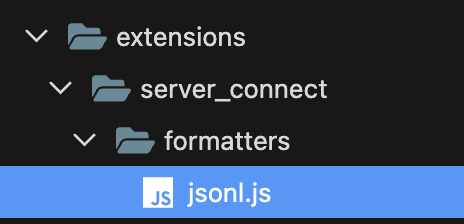ok. what i did so far was:
npm i jsonl
after that i created the folder.
This is the folder structure

and the file jsonl.js with that input:
const jsonl = require('jsonl');
exports.jsonl = jsonl;
as i seen in the youtube video it was for a model. do i also need the hjson file for a formatter?
in this thread they only created the slugify.js.
can you tell me what i need to put in my file so that i can select this via the wappler ui?
Or can you give me a tip where i can find the informations?
Thank you very much for your reply